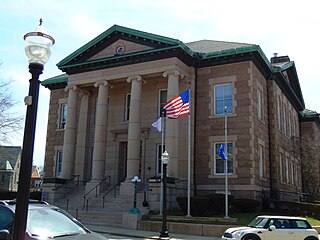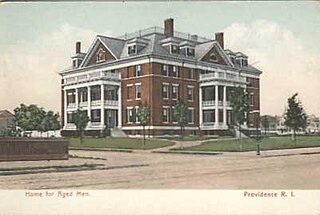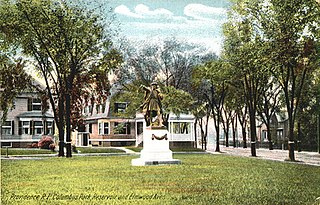Columbus is a Latinized version of the Italian surname "Colombo". It most commonly refers to:

Frédéric Auguste Bartholdi was a French sculptor and painter. He is best known for designing Liberty Enlightening the World, commonly known as the Statue of Liberty.

Johnston is a town in Providence County, Rhode Island, United States. The population was 29,568 at the 2020 census. Johnston is the site of the Clemence Irons House (1691), a stone-ender museum, and the only landfill in Rhode Island. Incorporated on March 6, 1759, Johnston was named for the colonial attorney general, Augustus Johnston.

Westerly is a town on the southwestern coastline of Washington County, Rhode Island, United States, first settled by English colonists in 1661 and incorporated as a municipality in 1669. It is a beachfront community on the south shore of the state with a population of 23,359 as of the 2020 census.

The Rhode Island State House, the capitol of the state of Rhode Island, is located at 900 Smith Street just below the crest of Smith Hill, on the border of downtown in Providence. It is a neoclassical building designed by McKim, Mead & White which features the fourth largest structural-stone dome in the world, topped by a gilded statue of "The Independent Man", representing freedom and independence. The building houses the Rhode Island General Assembly – the state House of Representatives is located in the west wing, and the Senate in the east – and the offices of the governor, lieutenant governor, secretary of state, and general treasurer of Rhode Island. Other state offices are located in separate buildings on a campus just north of the State House.

The Gorham Manufacturing Company was one of the largest American manufacturers of sterling and silverplate and a foundry for bronze sculpture.
Elmwood is a neighborhood in the South Side of Providence, Rhode Island. The triangular region is demarcated by Broad Street, Elmwood Avenue, and Interstate 95.

The Old Colony House, also known as Old State House or Newport Colony House, is located at the east end of Washington Square in the city of Newport, Rhode Island, United States. It is a brick Georgian-style building completed in 1741, and was the meeting place for the colonial legislature. From independence in 1776 to the early 20th century, the state legislature alternated its sessions between here and the Rhode Island State House in Providence.

This is a list of the National Register of Historic Places listings in Providence, Rhode Island.

The Elmwood Historic District encompasses two large residential sections of the Elmwood neighborhood of Providence, Rhode Island. The Elmwood area was mainly farmland until the mid-19th century, when its development as a residential area began, and these two sections represents well-preserved neighborhoods developed between about 1850 and 1920. The district was listed on the National Register of Historic Places in 1980.

The Thomas F. Hoppin House is a historic house at 383 Benefit Street in the College Hill neighborhood of Providence, Rhode Island. The house was built c. 1853 to a design by Alpheus C. Morse, and is an elaborate local example of an Italianate palazzo-style residence. The Library of Congress called the property "one of the largest and most elegant houses built in Providence in the mid-nineteenth century."

The Broadway–Armory Historic District is a historic district encompassing a mainly residential mixed-used urban area west of downtown Providence, Rhode Island.

Providence is the capital and most populous city of the U.S. state of Rhode Island. The county seat of Providence County, it is one of the oldest cities in New England, founded in 1636 by Roger Williams, a Reformed Baptist theologian and religious exile from the Massachusetts Bay Colony. He named the area in honor of "God's merciful Providence" which he believed was responsible for revealing such a haven for him and his followers. The city developed as a busy port, as it is situated at the mouth of the Providence River at the head of Narragansett Bay.

Frederick E. Field was an American architect who practiced in Providence, Rhode Island, and Orlando, Florida, in the period between 1883 and 1927.

Angel Taveras is an American lawyer and politician who served as the 37th mayor of Providence, Rhode Island, from 2011 to 2015. Taveras was the first Hispanic mayor of the city and the third elected and fourth serving Dominican-American mayor in the United States.

Commodore Oliver Hazard Perry Monument is a war monument in Cleveland, Ohio that commemorates Oliver Hazard Perry and his victory at the Battle of Lake Erie in the War of 1812. Erected at the center of the city's Public Square in 1860, its Perry statue by sculptor William Walcutt was Ohio's first monumental sculpture.

Columbus Square is a historic public square in the Historic Elmwood Neighborhood of Providence, Rhode Island. Located at the intersection of Elmwood Avenue and Reservoir Avenue, it serves as a gateway to Elmwood from the Reservoir and West End Neighborhoods.
Mashapaug Pond is the largest freshwater pond in the city of Providence, Rhode Island.

A statue of Caesar Rodney was installed in Wilmington, Delaware, United States. The statue was erected in Rodney Square in downtown Wilmington on July 4, 1923. It was designed by New York sculptor James Edward Kelly. The Gorham Company in Rhode Island cast the statue and its two bronze plaques. The memorial was removed in June 2020. It is currently being stored in New Castle, Delaware in a private storage facility. Its plans for future display are currently unclear, and its removal has generated controversy.

Elections are held in Providence, Rhode Island to elect the city's mayor. Such elections are regularly scheduled to be held in United States midterm election years.






















